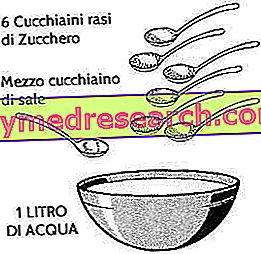Generality
Enteritis is the inflammation of the first part of the intestine (otherwise known as the small or small intestine).

The classic symptoms of enteritis are: diarrhea, abdominal pain, abdominal cramps, vomiting and fever.
Given the clarity of the pathological manifestations, in general, enteritis is diagnosed with a simple physical examination. More in-depth checks may still be indicated to understand the causes or when the disorder occurs in severe form.
With the exception of complications or the presence of very intense symptoms, healing takes place in a few days and without the need for specific treatment.
What is enteritis?
Enteritis is inflammation of the small intestine.
WHERE IS THE LOW INTESTINE?
The intestine is the portion of the digestive system between the pylorus and the anal orifice. From the anatomical point of view, it is divided into two main sectors: the small intestine, also called small intestine, and the large intestine, also called large intestine .

The large intestine is the terminal tract of the intestine and of the digestive system. It starts from the ileocecal valve and ends at the anus; consists of 6 sections (blind, ascending colon, transverse colon, descending colon, sigma and rectum), is about 2 meters long and has an average diameter of about 7 centimeters (hence the name of large intestine).
Table. subdivisions of the intestine.
| Main sections of the intestine | Length | Average diameter | Sections |
| Small intestine or small intestine | About 7 meters | About 4 centimeters | Duodenum Fasting ileo |
| Large intestine or large intestine | About 2 meters | About 7 centimeters | Blind Ascending colon Transverse colon Descending colon Sigma rectum |
DISSEMINATION OF ENTHERITE
Not all enteritis remains confined to the small intestine: some, in fact, can spread elsewhere and reach the stomach (gastro-enteritis) or the large intestine.
This usually occurs when the inflammation of the small intestine arises near its initial tract (therefore near the stomach) or the final one (therefore near the large intestine).
Causes
Most often, enteritis is due to the ingestion of food (food and / or water) contaminated by bacterial infectious agents. In all these cases, one speaks of infectious enteritis.
However, inflammation of the small intestine may also depend on:
- improper intake of some non-steroidal anti-inflammatory drugs (NSAIDs), such as ibuprofen and naproxen .
- Drug use, such as cocaine .
- Antitumor radiotherapy cycles.
- Inflammatory intestinal diseases of an autoimmune nature, such as Crohn's.
INGESTION OF FOOD AND CONTAMINATED DRINKS
Most cases of enteritis are explained by the ingestion of food or drink contaminated with bacteria; in other words with food poisoning .
Food contamination can occur for a variety of reasons; usually it occurs due to their improper treatment during the processing phase, or due to the non-sanitized environment in which they are stored, or due to the poor hygiene of the person handling them.
The bacteria that most frequently contaminate food and develop infections in humans are:
- Salmonella
- Escherichia Coli
- Staphylococcus aureus
- Campylobacter jejuni
- Shigella
- Yersinia enterocolitica
The foods most often associated with food poisoning are: all types of meat, unpasteurized milk and fresh products, such as fruit and vegetables.
People with food poisoning can directly infect healthy people.
ENTERITE AFTER USE OF COCAINE
Cocaine intake can (rarely) cause enteritis, since it reduces the flow of blood directed to the cells of the intestine ( intestinal ischemia ); if ischemia is severe, it can cause cell death and intestinal gangrene .
The most severe cases of cocaine enteritis result in a perforation of the affected small intestine tract.
ENTERITE DUE TO RADIOTHERAPY
Radiation therapy is an anticancer treatment that uses ionizing radiation to destroy the cells of a tumor. When practiced against an abdominal tumor or in the pelvic area, radiotherapy can cause damage not only to malignant cells (which are the target), but also to healthy intestinal cells. This damage involves the alteration of intestinal functions and the appearance of the so-called radiation enteritis (ER).
ENTERITE DUE TO AUTOIMMUNE DISEASES OF THE INTESTINE
Enteritis is a classic symptom of some inflammatory bowel diseases, of autoimmune origin, such as Crohn's disease .
In autoimmune diseases of the intestine, and in general in all autoimmune diseases, the patients' immune system attacks certain healthy cells in the human body. The consequence of this is damage to organs and tissues.
RISK FACTORS
An individual is more likely to get enteritis if:
- He drinks non-drinking water.
- It has close relationships with people infected with salmonella, campylobacter jejuni, yersinia enterocolitica etc.
- Travel to countries where hygiene is poor and bacterial contamination of food and water is frequent (for example in some parts of Africa).
Symptoms and Complications
The typical symptoms and signs of an enteritis are: watery diarrhea, abdominal pain, abdominal cramps, nausea, vomiting, loss of appetite, fever and, finally, the presence of blood or mucus in the stool .
WHEN TO REFER TO THE DOCTOR?
Enteritis generally heals in 3-4 days and without the need for specific care.
If, however, the symptoms last longer than expected, if the blood in the stool becomes noticeable or, again, if the fever continues unabated, then it is good to contact your doctor and book an appointment.
COMPLICATIONS
When an individual suffers from a severe or prolonged form of enteritis, he or she may lose a lot of fluids due to diarrhea, vomiting and fever (which causes sweating).
The excessive lack of water / liquids in the body is called dehydration . Therefore, a dehydrated individual is a person who does not take in enough water and / or loses too much. The children with enteritis most at risk of dehydration are children and adolescents.
Summary of the main symptoms of dehydration.- Dry mouth
- Reduced amount of tears
- Sunken eyes
- Reduced volume of urine produced
- Dark urine
- Fatigue
- Sunken drinking fountains (only in newborns)
Dehydration is considered a dangerous medical condition, therefore it should be treated as soon as the onset is detected.
Diagnosis
To diagnose enteritis, a thorough physical examination may suffice, during which the doctor asks the patient what symptoms he feels and when he started feeling sick (for example, a trip to certain countries in Africa is particularly indicative and rich of meaning).
The need for more thorough checks arises when the symptoms of enteritis are severe and do not hint at improving. The examinations carried out in these situations are, generally, the blood tests and the so-called coprocoltura.
BLOOD TESTS
Blood tests allow the doctor to clarify the causes of enteritis, because:
- If a state of anemia emerges, it may mean that the patient suffers from Crohn's disease.
- If traces of cocaine emerge, it means that the patient has used this drug.
The knowledge of the causes is not an end in itself, but allows to plan the most appropriate treatment.
coproculture
Coproculture is a microbiological examination aimed at finding particular microorganisms in the faeces. It is performed when enteritis is suspected to be due to poisoning from contaminated food, in order to trace the exact type of bacterium involved and establish the best antibiotic cure.
Treatment
The less severe cases of enteritis usually recover within a few days and without the need for special care. The only recommendation, in these situations, is to take abundant liquids.
On the other hand, severe and / or prolonged cases require different attentions: first of all, an appropriate rehydration and the administration of antidiarrheal drugs are needed; secondly, the causes must be adequately treated.
FUNDAMENTAL POINTS

(NB: glucose solutions are also a means of nutrition).
- When is the patient hospitalized? In case of severe enteritis, hospitalization may be necessary, as the patient needs to be rehydrated and fed intravenously. Moreover, with the admission, the patient is kept under continuous observation, in such a way as to prevent a possible worsening of his health conditions.
- The most indicated drugs . The most commonly administered drugs in case of enteritis are antidiarrheal drugs (ie drugs against diarrhea). They are prescribed in case of severe enteritis and when the diarrhea shows no signs of passing. The best known antidiarrheal is loperamide .
- Treatment of triggers . When enteritis is severe or prolonged, treating even the causes that trigger it is important and, sometimes, essential for healing. In the event of severe food poisoning, the therapeutic treatment provided is based on antibiotics ; in case of Crohn's disease or other autoimmune diseases that cause enteritis, immunosuppressive drugs are needed; in the case of radiation enteritis, interruption (at least temporary) of radiotherapy is required; finally, if the patient is taking drugs that favor enteritis or drugs such as cocaine, they must immediately (or prevent) their use.
Prevention
Premise: the preventive measures that will be reported below refer to enteritis caused by the ingestion of contaminated food, as they are the most frequent pathological forms and can potentially affect anyone.
Good personal hygiene and safe food treatment are essential to prevent enteritis from food poisoning. In the absence of these two conditions, in fact, any food runs the risk of being contaminated by bacterial pathogens.
HYGIENIC COUNTERMEASURES
First of all, it is good practice to wash your hands with soap and water or (if these are not available) with special detergent wipes; this operation must be repeated several times during the day, especially at the following times: before cooking, before starting a meal and after being in the bathroom.
Advice for good personal hygiene.
- When possible, wash your hands with soap and water several times a day.
- Wash your hands after each use of the bathroom
- Wash your hands whenever you are going to cook
- Wash your hands before starting a meal
- If you do not have running water and soap, use special cleaning wipes
PREPARATION, COOKING AND CONSERVATION OF FOODS
When preparing food and drink, clean kitchen utensils must be used. If you have any doubts about it, it is better to clean the tool in question.
Furthermore, it is advisable to keep certain foods, such as meat from fresh vegetables, separate and to wash the surfaces of the kitchen quite frequently.
When cooking, it must be done at the appropriate temperatures: the meat, in particular, must be cooked appropriately, to avoid the survival of some bacteria.
Finally, when you want to keep leftovers, you should put them in the freezer promptly; if they stay too long in the open air, in fact, they can collect bacteria and other dangerous pathogenic microorganisms.
Table. Hygiene in the kitchen
Preparation:
- Before starting, make sure that the kitchen utensils (plates, cutting boards, knives, etc.) are clean
- Separate raw meat from fresh foods such as vegetables and fruit
- Wash kitchen surfaces often
Cooking:
- Cook the food at the correct temperature
- Inquire about how to cook meat properly (each type of meat has an ideal cooking temperature)
Storage:
- Put leftovers and foods you want to keep for a few days in the freezer.
- Write down the expiration dates if the food put in the freezer is transferred to a container other than the original.
Prognosis
Most cases of enteritis resolve without special treatment and within a few days.
Hospitalization and intravenous administration of rehydrating and nourishing solutions are only expected in case of severe enteritis; the same applies to antidiarrheal drugs, which otherwise could even be contraindicated.
In some unfortunate cases, radiation enteritis can cause serious damage to the intestine, so much so that surgery may be necessary.




